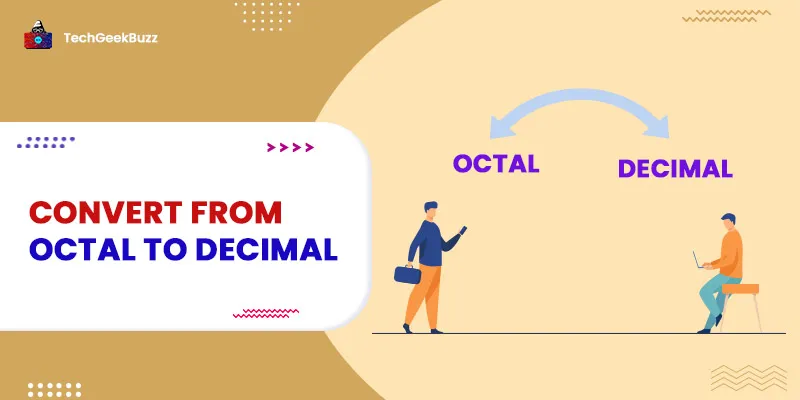Here in this article, we have provided Java and C source codes, that ask the user to enter a number in decimal and convert it to the Decimal number system.
Example:
Input: Octal: 011 Output: Decimal: 9 Input: Octal: 20 Output: Decimal: 16 Input : Octal: 40 Output: Decimal: 32
Octal Number System
Octal number system has a base of 8 and it represents its number using 0 to 7.
Decimal Number System
In decimal number system we have 10 digits 0 to 9 to represent a number.
Logic: Octal to Decimal
There is an easy logic to convert an Octal number to Decimal.
- Take an octal number which must be a combination of numbers including [0-7].
let's take an octal number 75
- Extract the number from left to right digit by digit.
Extract 75 from left to right. 7 and 5.
- Multiply the extracted numbers with 8 to the power of number unit.
7 is at 1st position so it would be multiplied with 8^1 5 is at 0 position so it would be multiplied with 8^0 7 * (81)=56 and 5 * (80)=5
- Now add them all.
56 + 5 =61
Another example:
Octal 134
/ | \
/ | \
1 3 4
/ | \
/ | \
1*(82) + 3*(81) + 4*(80)
\ | /
\ | /
64 + 24 + 4
\ | /
\ | /
Decimal 92
Java Program to Convert Octal to Decimal
import java.io.*;
import java.util.Scanner;
import java.lang.Math;
class Tech {
//Conversion method
static int oct_to_dec(int n)
{
int dec_num = 0;
// The unit value is 0 for the last digit
int unit = 0;
int temp = n;
int digit;
while (temp > 0) {
// Extract the Octal number from last digit
digit = temp % 10;
temp = temp / 10;
//multiply the digit with 8 to the power base unit
dec_num += digit * Math.pow(8, unit);
unit = unit +1;
}
return dec_num;
}
public static void main(String[] args)
{
Scanner sc= new Scanner(System.in);
System.out.print("Octal: ");
int num= sc.nextInt();
System.out.println("Decimal: "+oct_to_dec(num));
}
}
Output:
Octal: 1575
Decimal: 893
C Program to Convert Octal to Decimal
using namespace std;
#include<stdio.h>
#include<math.h>
int oct_to_dec(int n)
{
int dec_num = 0;
// The unit value is 0 for the last digit
int unit = 0;
int temp = n;
int digit;
while (temp > 0) {
// Extract the Octal number from last digit
digit = temp % 10;
temp = temp / 10;
//multiply the digit with 8 to the power base unit
dec_num += digit * pow(8, unit);
unit = unit +1;
}
return dec_num;
}
int main()
{
int n;
printf("Octal:");
scanf("%d", &n);
printf("Decimal:%d ",oct_to_dec(n));
return 0;
}
Output:
Octal:2345
Decimal:1253
Python Program to Convert Octal to Decimal
def oct_to_dec(n):
dec_num =0
unit =0
temp =n
while(temp>0):
digit = temp%10
temp =temp//10
dec_num+=digit*pow(8,unit)
unit+=1
return dec_num
n= int(input("Octal: "))
print("Decimal:", oct_to_dec(n))
Output:
Octal: 23456
Decimal: 10030
People are also reading:
- WAP to display a message on screen
- WAP to Display Fibonacci Series
- WAP to Calculate Simple Interest
- WAP to check whether the entered number is prime or not
- WAP in C++ & Python to find whether a number is a palindrome or not
- WAP to find the divisors of a positive Integer
- WAP to print the truth table for XY+Z
- WAP to create a loading bar
- WAP to Print the Following Pattern
- WAP to Print the Following Triangle


![What is an Assembler? [Definition, Working, & Types]](/media/new_post_images/What_is_Assembler.jpg)
![What is I/O? [Types, Examples, & Methods]](/media/new_post_images/What_is_I_O.webp)

Leave a Comment on this Post